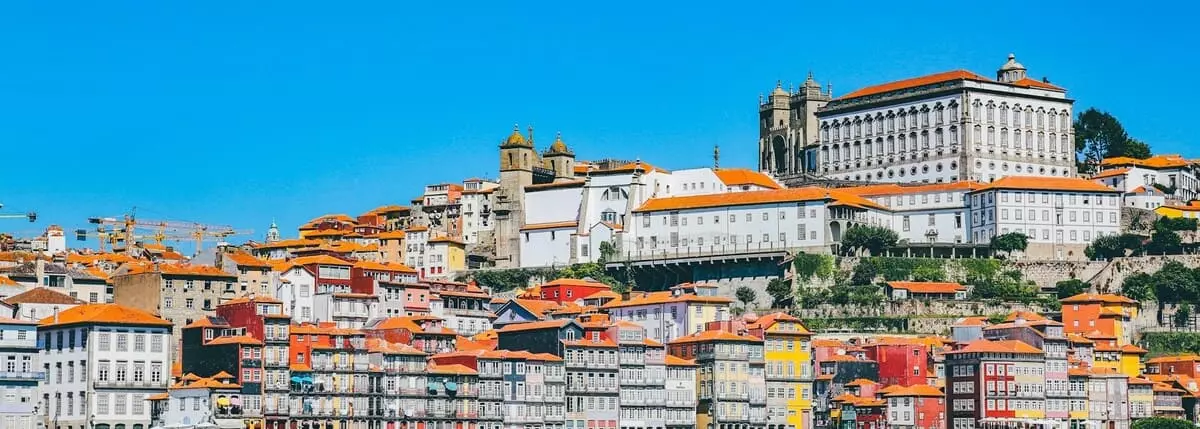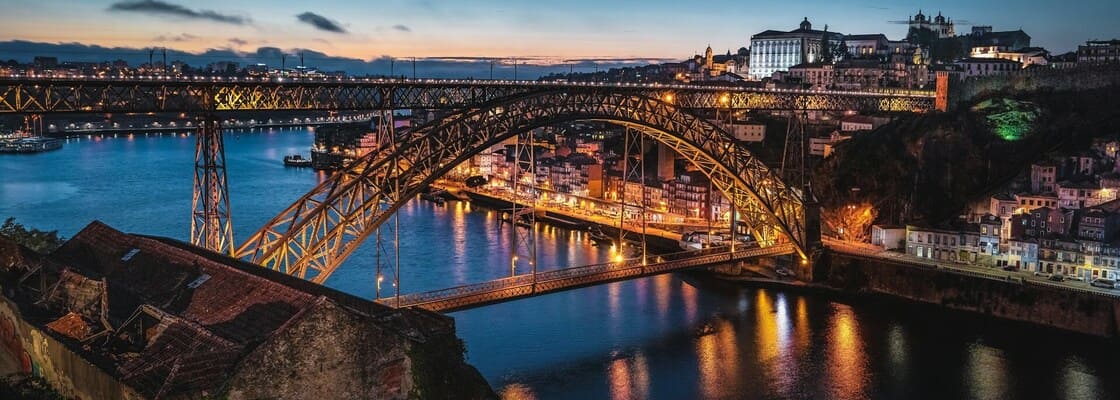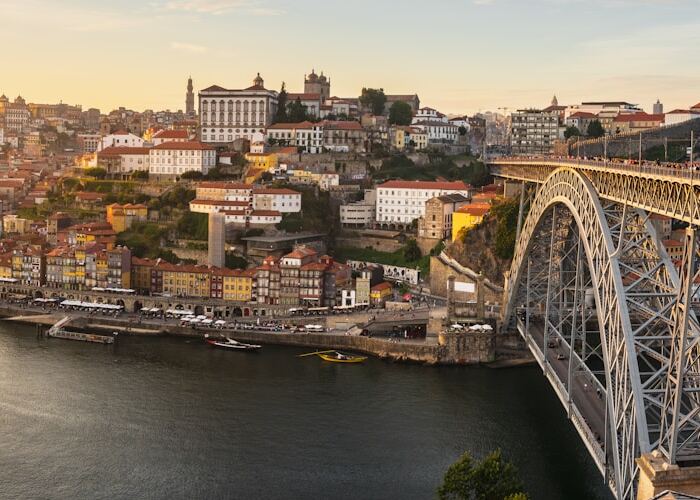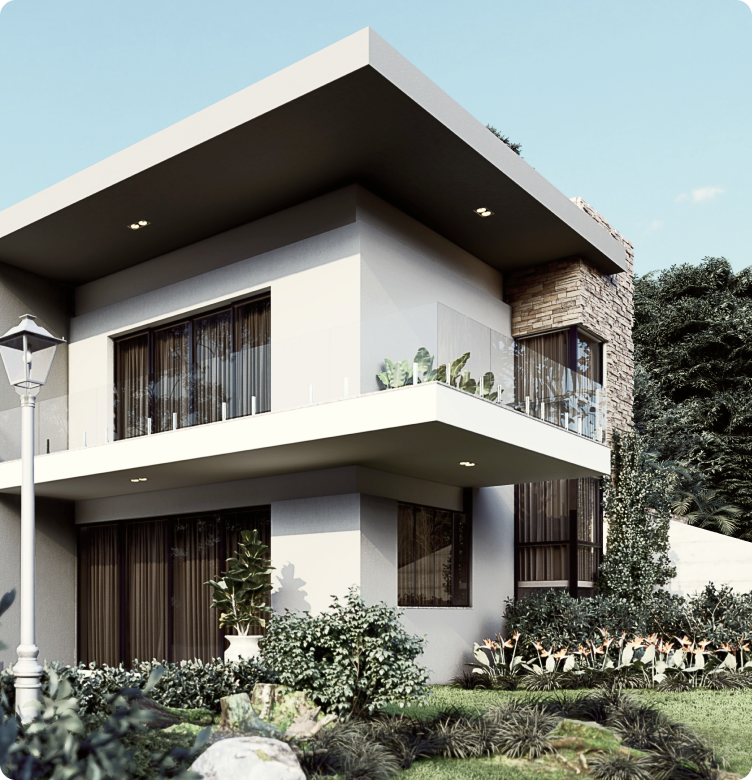Over the past few years, living in Porto, Portugal, has become a popular choice for expats, attracting people from all walks of life, including retirees, families, and digital nomads from across the globe.
As the country’s second-largest city, Porto stands out as one of the most charming and exciting cities in northern Portugal. The city is known for its beautiful river views, vibrant cultural and historical experiences, and access to stunning coastlines.
Nestled along the Douro River in northern Portugal, Porto has also grown in popularity thanks to its growing tech sector and the affordable yet high quality of life it offers residents.
In this guide to living in Porto, we will explore everything you can look forward to about living in this sought-after location as an expat, including the best neighborhoods to live in, the cost of living in Porto, and the pros and cons to bear in mind when you make this beautiful city your new home.
An Overview of Portugal's Second City, Porto

Porto is a great city filled with rich history, unique architecture, and a modern flair. Becoming just as popular as the cosmopolitan city of Lisbon when it comes to living in Portugal, the charming city of Porto, Portugal, features distinct neighborhoods, each boasting its own character where the cobbled streets offer many art galleries, and trendy bars and restaurants.
You will also be able to see the bright lights of the Port wine houses gleaming on the opposite side of the Douro River, in the neighboring city of Vila Nova de Gaia. Tourists and expats alike enjoy Porto’s proximity to the beautiful beaches along the Atlantic Ocean, especially in upmarket areas like Foz do Douro.
With its combination of old-world charm and access to modern amenities, Porto is fast becoming one of the best cities to live and work in Europe. Porto secured 10th place in the Knight Frank 2023 Wealth Report due to the 12.7 percent price increase in the city’s luxury real estate market.
Where is Porto located?
Porto is located in the north of Portugal, with Spain to the north. Nestled along the Douro River directly opposite the city of Vila Nova de Gaia, Porto offers stunning views, beautiful landscapes, open green spaces, and much more to discover, including the Douro Valley.
Porto’s reputation as one of the most desirable locations in Portugal is also highlighted by its recognition as Europe’s Leading Seaside Metropolitan Destination in 2024 by the World Travel Awards, ahead of other famous coastal cities like Barcelona, Venice, and Istanbul.
For expats, Porto also offers several coworking spaces, such as Porto.io and WeWork, where you can connect with the local and expat communities.

History and culture of Porto
Porto is considered to be one of the most historic locations compared to other European cities, and the city’s origins trace back many centuries, specifically to the 8th Century B.C. when it was first officially formed as a city.
Porto’s historic center is a National Monument of Portugal, and in 1996, the historic center was named a UNESCO World Heritage Site, which highlights the city’s rich historical significance. The iconic landmarks within the historic center include the Luiz I Bridge, and the Monastery of Serra do Pilar, which offer stunning views over the Douro River and speak to the city’s architectural grandeur.
Architecture in Porto
In addition to Porto’s striking modern architecture it is famous for, the city’s rich architectural history is evident in its blend of Romanesque, neoclassical, and Manueline-style buildings, including its cathedral, Stock Exchange, and the Church of Santa Clara, which showcase the city’s architectural diversity. Porto is also home to the Oporto School of Architecture, which is regarded as one of the most prestigious architecture schools in the world.
Culture and culinary heritage in Porto
Porto’s history also intertwines with its culinary heritage. From modern upscale restaurants to traditional eateries, the city has it all. The city is known for traditional Portuguese dishes such as Tripas à Moda do Oporto, a tripe dish that is deeply connected to the city’s identity, and Bacalhau à Gomes de Sá, a popular codfish recipe originating from the city.
The São João Festival, Porto’s most celebrated event, is held on the night of June 23-24, with traditions like eating sardines and boiled potatoes, symbolizing the city’s deep connection to both its culinary and cultural roots.
The Francesinha, a beloved native sandwhich, is a meaty sandwich covered in cheese and a rich beer-based sauce. It reflects Porto’s love for hearty, flavorful food. Rojões and sarrabulho, both pork-based dishes, are typical of the Norte region and remain popular in Porto’s vibrant food culture.
Additionally, Sardinha Assad, or grilled sardine, is a classic dish found in coastal cities like Porto, where fresh fish is abundant. Porto is also internationally famous for its production of Port wine, a dessert wine crafted along the Douro River and a symbol of the city’s influence in the world of wine.
Why live in Porto?

Portugal and other European countries are filled with charming cities, and Porto is a friendly city that has been overlooked in the past as an attractive expat destination.
However, the city has many features that make it one of the best places to settle as an expat, offering a vibrant culture and affordable living costs where you can enjoy a comfortable life.
In the sections below of this living in Porto guide, we will explore a few of the best reasons to live in Porto, which will hopefully help you decide if this beautiful city in Western Europe is the best European destination for you.
Quality of life
Porto is a vibrant city with much to offer in terms of quality of life. Though not a small city, it boasts a relaxed and friendly atmosphere, making it an ideal destination for families and expats.
One key aspect contributing to Porto’s high quality of life is its top-notch healthcare system. The Portuguese public healthcare system (Serviço Nacional de Saúde) is considered one of the best in the world.
Whether you’re a legal resident or an expat, you’ll have access to healthcare through the national health service offered at any local health center. Private healthcare options are also available, and many expats choose private health insurance for added flexibility and convenience.
Porto’s relaxed and welcoming culture adds to the city’s charm. Known for its friendly locals, you’ll quickly feel at ease in a community that embraces both tradition and modernity. The city’s pace is far less frantic than that of other major cities, contributing to a higher quality of life.
In addition, Porto is celebrated for its epic fine dining. From traditional Portuguese meat and seafood dishes to vegetarian options, there’s something for every palate—without the hefty price tag of many other European cities.
For those seeking reliable public transportation, Porto’s extensive metro public transport system, taxis, and services like Uber and Bolt make it easy to navigate the city. Plans for a high-speed railway linking Porto to Lisbon are in place, further enhancing its connections.
With an international airport and well-linked train stations, Porto offers great connections for both domestic and international travel, making it a hub for exploring all that Portugal and beyond have to offer.
Safety and tolerance
Living in Porto as an expat has a lot to offer. As Portugal’s second-largest cosmopolitan city, Porto offers the opportunity to enjoy a relaxed lifestyle, vibrant cultural events, and delicious local cuisine.
Portugal consistently ranks as one of the safest countries in Western Europe, ranking 7th in the 2024 Global Peace Index. Porto contributes to Portugal’s reputation as one of the safest countries in the world, with its low crime rates and overall friendly and welcoming vibe.
Portuguese people are known for their kindness, and this is particularly true in Porto, where locals are approachable and friendly. Even though English is widely spoken in Portugal, it would be a great idea to learn to speak Portuguese, as this can make it easier to navigate daily life.
Business and employment opportunities
Porto offers a wide range of business and employment opportunities, particularly for those in the tech sector and expats working for international companies. Many international businesses are setting up operations in Lisbon and Porto, which has created a dynamic job market for professionals with diverse skill sets in both cities.
Additionally, a recent European Labour Authority report highlights labor shortages in Portugal, particularly in professions like software developers, applications programmers, electrical engineers, medical practitioners, and hospitality sector workers.
English is widely spoken in Portugal, and English-speaking jobs are common in major cities like Porto, especially within multinational companies. If you are a digital nomad, you will also find a large number of co-working spaces available at an affordable cost, making Porto a vibrant hub for remote workers.
Access to beautiful beaches
Whether for active adventures or peaceful moments, Porto’s beaches offer an ideal escape. Porto’s prime location by the Atlantic Ocean offers access to beautiful beaches, perfect for both relaxation and water sports activities.
Matosinhos Beach, known for its golden sands and lively boardwalk, is ideal for leisurely walks and dining by the sea. Praia da Luz, with its calm waters, invites you to swim and unwind, making it a serene spot for retirees.
Additionally, the beaches near Vila Nova de Gaia provide more stunning options to explore. The favorable climate ensures you’ll spend many hours near the sea, enjoying the tranquility and beauty of Porto’s coastline. However, it is important to note that northern Portugal temperatures are generally cool than they are in the southern regions of the country.
Discovering the Best Neighborhoods for Living in Porto

Porto is a welcoming city and one of Portugal’s most beautiful cities, offering a number of sought-after postal codes to make your new home. In the sections below, we will explore a few of the areas in Porto that are considered to be some of the most desirable locations in Portugal for expats moving to this beautiful country.
Ribeira and Miragaia
Ribeira and Miragaia are two of the city’s most charming and sought-after areas., offering a perfect blend of history, culture, and charm.
Ribeira, with its UNESCO World Heritage status, is a historic neighborhood located by the Douro River, known for its cobbled streets, colorful houses, and vibrant cultural scene. Expats are drawn to its stunning views and beautiful architecture, making it a treasure trove for those seeking an authentic Portuguese experience.
Meanwhile, Miragaia, also nestled by the Douro, offers a more peaceful yet equally picturesque setting. Its narrow, cobbled streets are lined with townhouses and quaint eateries where you can enjoy classic Portuguese meals.
The views of the river from Miragaia’s higher points are particularly breathtaking. Both neighborhoods cater to a range of budgets and lifestyles, ensuring that expats can find properties that suit their budget without sacrificing comfort.
From the historic Ponte Luís I bridge to the lively restaurants, both Ribeira and Miragaia offer expats a unique opportunity to immerse themselves in Porto’s rich heritage, making them ideal locations for those interested in living in Porto.
Cedofeita and Boavista
Cedofeita and Boavista are two of the most desirable neighborhoods for expats seeking a balance of urban living and culture in Porto.
Cedofeita, with its modern vibe, offers a variety of bustling restaurants, rooftop bars, and cultural attractions in a less touristy setting. This vibrant quarter is home to Porto’s longest avenue, Avenida da Boavista, and features peaceful green spaces like botanical gardens and unique venues such as a synagogue and a concert hall.
Cedofeita’s lively atmosphere is perfect for those looking to immerse themselves in local life while enjoying easy access to open areas like Parque da Cidade do Porto city park.
Boavista, known for its upscale residential charm, blends culture with convenience. The dynamic neighborhood is well-connected and offers a mix of commercial and residential streets. It also offers architectural and cultural features like the iconic Casa da Música concert hall and the Fundação Serralves cultural institution.
Avenida da Boavista runs through the district, leading to the sea, making it a pleasant urban promenade. Both Cedofeita and Boavista feature vibrant nightlife, concept stores, galleries, and terraces while providing access to Porto’s finest green spaces, making them ideal for expats who crave a lively yet comfortable lifestyle.
Foz do Douro
Foz do Douro, one of Porto’s most affluent areas, is a top choice for expats seeking a high-quality lifestyle by the sea. This charming seafront neighborhood features stunning sandy beaches like Praia da Luz and Praia do Homem do Leme.
With its vibrant dining scene offering both traditional Portuguese and international cuisine, expats can enjoy a variety of culinary experiences. The area is also home to the Mercado da Foz market, where local delicacies and fresh produce are sold.
Additionally, the area’s elegant boutiques, art galleries, and beautiful architecture make Foz do Douro a highly desirable place to live.
Bonfim and Campanhã
Bonfim, Campanhã, and Downtown Porto are three of the most desirable neighborhoods for expats looking to live in Porto. Bonfim, located near downtown, offers a lively blend of old and new.
With its traditional stores sitting alongside specialty coffee shops, craft beer pubs, and interesting concept stores, it attracts a mix of tourists, art students, and expats. The nearby Faculty of Beaux Arts adds a creative flair to the neighborhood, making it an appealing spot for those who enjoy a vibrant atmosphere.
Campanhã, though smaller, holds great importance due to its role as a transport hub. The 19th-century Campanhã train station connects residents to most areas in Porto, offering all the benefits of seamless travel and daily commuting by metro line.
Downtown Porto is a compact and beautiful part of Porto which is easy to navigate. Opened in 1916, the stunning São Bento Railway Station, adorned with iconic traditional Portuguese blue tiles, serves as a National Monument and a daily reminder of Porto’s rich history with its light filled spaces and artistic murals.
Additionally, the proximity of Crystal Palace Gardens offers breathtaking views and peaceful green spaces, perfect for weekend strolls. These neighborhoods combine tradition, convenience, and beauty, making them top choices for expats settling in Porto.
Vila Nova de Gaia
Vila Nova de Gaia, located just across the River Douro from Porto, is quickly becoming one of the most desirable areas for expats. The city boasts stunning views and beautiful, affordable properties, often at a lower cost than those found in Porto itself.
Expats are drawn to its rich cultural heritage, many wine cellars offering world-famous Port wine, and a number of wine lodges offering tours and tastings.
The historic Dom Luís I Bridge connects the two cities, with visitors crossing to explore Gaia’s winding lanes and visit the Serra do Pilar church, which offers breathtaking panoramic views of Porto.
Vila Nova de Gaia is not just about wine and views, though. It is also near some of the best beaches in the north, such as Praia da Madalena, and the local restaurant scene is thriving.
With its proximity to Porto and a more affordable cost of living, this beautiful city offers a unique balance of culture, nature, and modern amenities with many wine cellars and traditional restaurants, making it an attractive choice where you can enjoy a peaceful yet connected lifestyle.
Vila do Conde
Located just 30 minutes from Porto, Vila do Conde is becoming one of the most desirable places for expats to live in the Greater Porto region. This charming seaside town offers a perfect balance between tranquility and accessibility.
Its peaceful environment, coupled with high levels of cleanliness, security, and air quality, makes it an ideal location for families seeking a quieter lifestyle while staying well-connected to the city. The metro system provides easy access to Porto, making commutes effortless.
Historically, Vila do Conde thrived as a ship-building hub contributing to the town’s growth and prosperity. Today, it retains its maritime heritage and is also known for its intricate lace-making tradition, preserved by the Escola de Rendas art form and showcased in the Lace Museum in the town center.
Visitors and residents alike can also enjoy unique experiences, such as tuk-tuk tours of the scenic coastline or exploring the Nozzle Horn-protected landscape area.
Cost of Living in Porto

According to Numbeo, compared to the city of Los Angeles, California, in the USA, the cost of living in Porto is 48.8 percent lower than in Los Angeles, including rent. Additionally, rent prices in Porto are 56.9 percent lower than in Los Angeles, and you would need an income of around €3,875 ($4,252) in Porto to maintain the same standard of life that you can have with €7,562 ($8,300) in Los Angeles.
Food and dining expenses
Food and dining in Porto, Portugal, are significantly more affordable than in Los Angeles. Restaurant prices in Porto are 53.7 percent lower, and groceries are 47.9 percent cheaper compared to Los Angeles. For example, a three-course meal for two at a mid-range restaurant will cost around €109.37 ($120) in Los Angeles, while in Porto, a similar meal is only about €45 ($49.37).
Additionally, compared to Barcelona, Spain, a three-course meal for two at a mid-range restaurant will cost around €45 in Porto, while in Barcelona, will cost around €60.
Transportation costs
Public transport in Porto is safe and reliable compared to cities in other European countries. According to Numbeo, a one-way ticket on local transport in Porto will cost around €1.80 ($1.97), while in Los Angeles, the same ticket would cost around €1.60 ($1.75).

Education in Porto
Just like the country’s national health service, Portugal’s education system has become known worldwide for offering top-quality Portuguese schools. In addition to other cities in the country, major cities like Lisbon and Porto are especially known for the country’s best education facilities, from early childcare institutions to Portuguese universities.
In 2023, Portugal ranked 8th in the Education First (EF) global ranking of countries and regions’ English proficiency survey, proving to be more English proficient than South Africa, Germany, and Croatia. In the sections below of this Living in Porto guide, we will explore schools and universities and language considerations for expats.
Schools and universities
Education in Portugal is split into three levels according to the European Union’s Eurydice network, namely, pre-school education, basic education, and upper secondary education. The education system is further structured in the following phases, whether you enroll in a private or public school in Portugal:
- Preschool education: Pre-primary school for children aged 3 to 6 years old
- Primary education: The first cycle of mandatory primary school lasts 4 years and is for children aged 6 to 10. The second cycle consists of an additional 2 years and is for students aged 10 to 12
- Secondary education: The secondary school system also consists of two cycles. The first three-year cycle is for students aged 12 to 15, and the second secondary education period, referred to as upper secondary education, consisting of the 10th, 11th, and 12th grades, is for students aged 15 to 18
- Higher education: Once students aged 18 and above have completed these phases, they can choose to study further through Portuguese universities or polytechnic institutions
Portugal is home to 51 top-tier international schools, with a few of the most prominent schools, including the Oporto British School, located in Porto. Our migration and residency partner, Global Citizen Solutions, offers more insight into international school options in the country in this comprehensive International Schools in Portugal guide.
The Portuguese higher education system consists of universities and polytechnic institutes. Seven universities regularly feature in the QS World University Rankings, including top-ranked institutions like the University of Porto.
Universities in Portugal offer a range of degree programs, including bachelor’s, master’s, and doctoral degrees, while polytechnic institutes focus on providing undergraduate and master’s degree programs specifically tailored to vocational and profession-based education.
Language considerations
While speaking Portuguese is not mandatory for expats living in Porto, learning it can be beneficial for job opportunities and integration, just as it would be in other countries. English speakers can still find roles in sectors like customer service, tourism, and tech, as English is widely spoken, especially in major cities like Porto.
Many international and Portuguese companies offer English-speaking positions. However, learning Portuguese can open up additional opportunities, both socially and professionally. International and private language schools in Porto provide Portuguese courses, helping expats better integrate into the workforce and the local community.
The Cost of Housing in Porto

From modern apartments with incredible views to traditional villas in trendy neighborhoods, Porto offers property types and prices to suit every budget and lifestyle.
Renting in Porto
If you are not ready to make a permanent investment in Porto, renting is a good option to begin with when you relocate to the city. According to Numbeo, a one-bedroom apartment in the city center will cost about €1,032.35 ($1,132.65) per month in Porto, while in Los Angeles, USA, a one-bedroom apartment in the city center will cost about €2,214.82 ($2,430.00) per month.
Buying a home in Porto
Whether you are looking for a modern riverside apartment, a traditional townhouse in the historic center of Porto, or a spacious family home, Porto’s vast array of property types cater to all buyers.
In 2023, the average asking price for property in the Porto city center was €4,296 per square meter, while in the Greater Porto Municipal Area, it was €3,291 per square meter.
Additionally, it is important to note that the 2024 Knight Frank Wealth Report revealed that luxury real estate prices reflected a positive annual price growth of 5 percent, surpassing prominent luxury real estate destinations such as Milan, Rome, and the Cayman Islands in luxury property growth.
The table below shows the average asking price per square meter for property in the different Porto neighborhoods in 2023.
Porto Neighborhood | Price Per Square Meter (€) |
Aldoar, Foz do Douro e Nevogilde | €5,678 |
Bonfim | €4,404 |
Campanhã | €3,520 |
Centro Histórico do Porto | €4,665 |
Lordelo do Ouro e Massarelos | €4,651 |
Paranhos | €3,531 |
Ramalde | €3,529 |
Visas and Residency Permits for Expats Living in Porto

The Portuguese government offers a range of residency options, which make the dream of living in Porto, Portugal, as an expat straightforward and easy to navigate.
Portuguese visa options for non-EU citizens include the residence by investment program, the Portugal Golden Visa, the Digital Nomad Visa (D8 Visa) for remote workers, and the Portugal D7 Visa for retirees and other expats who do not have Portuguese source incomes. There are also many other visa options open, making it relatively easy to relocate to Portugal compared to some other EU countries.
Living in Porto as an EU citizen
If you are a citizen of the European Union (EU) or the European Economic Area (EEA), you won’t need a visa to relocate and live in Porto, Portugal.
Living in Porto as a Non-EU citizen
As a non-EU, non-EEA, or non-Swiss citizen, you will need to apply for an entry visa or temporary stay visa to live in Portugal for longer than 90 days. Once you acquire a temporary residency visa through one of the various visa programs offered by the Portuguese government, and dependent on the visa program you apply for, you can apply for a permanent residency visa.
Portuguese visa options for foreigners
Portugal offers several visa options for non-EU citizens interested in living in Porto, Portugal. The Portugal Golden Visa allows individuals to gain residency through investment in the country through qualifying sectors.
Portugal Golden Visa investment options include fund subscription, scientific research activities, and the creation of jobs.
For retirees or those with passive income, the D7 Visa also referred to as the retirement or passive income visa, enables relocation if applicants can prove sufficient income to support themselves.
The Digital Nomad Visa is designed for remote workers employed by non-Portuguese companies. To qualify, applicants must earn at least four times the Portuguese minimum wage, making it an attractive option for location-independent professionals.
Our residency and citizenship division, Global Citizen Solutions, will help you find the best visa option if you are interested in living in Porto, Portugal.
Find Your Dream Property with BE Global

BE Global Properties is the discerning property investors’ gateway to meticulously curated properties that transcend ordinary listings. Look no further when searching for your next dream home or investment property in the Portuguese luxury real estate market.
Explore our exclusive listings and work with our experts who offer market insights for smart investment choices and exceptional customer service to find the property investment perfectly tailored to your lifestyle.
Contact BE Global Properties today and start your journey to find your global haven.
Frequently Asked Questions about Living in Porto
Is Porto a nice place to live?
Porto is a wonderful place to live, offering a blend of cultural vibrancy, stunning architecture, and proximity to beaches. Its affordable cost of living, international schools, friendly locals, and excellent healthcare make it appealing to retirees, digital nomads, and families alike. With a rich cuisine and diverse recreational options, Porto suits every lifestyle.
How much money do you need to live comfortably in Porto?
To live comfortably in Porto, an income of approximately €3,875 ($4,252) is necessary, significantly less than the €7,562 ($8,300) required in Los Angeles. While costs have risen over time, Porto remains more affordable than Lisbon, with overall living expenses about 48.8 percent lower than in the American city of Los Angeles.
Is living in Porto expensive?
Living in Porto is generally affordable compared to many European cities. Food and dining costs are significantly lower, with restaurant prices about 53.7 percent cheaper than in Los Angeles. Public transport is also reasonably priced, making it an attractive option for those looking to enjoy a vibrant lifestyle without overspending.
Is Porto good for expats?
Porto is an excellent choice for expats, boasting a vibrant international community and numerous coworking spaces. The amazing city offers a rich cultural lifestyle, making it ideal for families, retirees, and singles. With abundant job opportunities across various sectors, Porto is increasingly popular among expatriates seeking a new home.
How do I retire in Porto, Portugal?
To retire in Porto, you can apply for the Portugal D7 Visa, ideal for those with a steady passive income. This visa allows retirees to escape high living costs in their home countries and embrace the sunny climate and high quality of life that Portugal has to offer.



